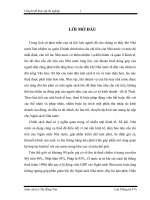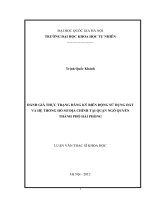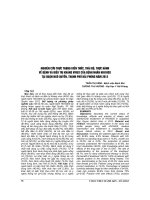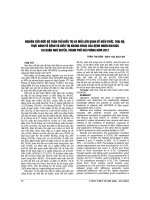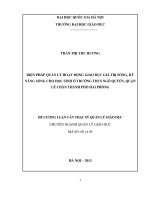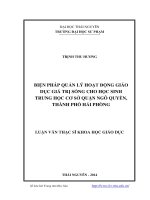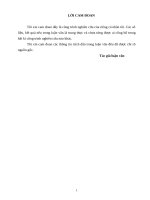Đề thi thử THPT Quốc gia năm 2020 môn Anh trường THPT Ngô Quyền, Thành Phố Hải Phòng lần 1 mã đề 241 - Học Toàn Tập
Bạn đang xem bản rút gọn của tài liệu. Xem và tải ngay bản đầy đủ của tài liệu tại đây (202.56 KB, 5 trang )
<span class='text_page_counter'>(1)</span><div class='page_container' data-page=1>
SỞ GD&ĐT HẢI PHỊNG
<b>TRƯỜNG THPT NGƠ QUYỀN </b>
<b>ĐỀ THI THỬ LẦN I </b>
(Đề thi gồm 05 trang)
<b>KỲ THI TRUNG HỌC PHỔ THÔNG QUỐC GIA NĂM 2020 </b>
<b>Môn thi: TIẾNG ANH 12 (Ngày thi 29/12/2019) </b>
<i>Thời gian làm bài: 60 phút, không kể thời gian phát đề </i>
<i><b>Mark the letter A, B,C or D on your answer sheet to indicate the word whose underlined part </b></i>
<i><b>differs from the other three in pronunciation in each of the following questions. </b></i>
<b>Question 1. A. </b>str<b>a</b>nger <b> B. </b>tr<b>a</b>nsfer <b> C. a</b>ncient <b> D. </b>educ<b>a</b>te
<b>Question 2. A. </b>plant<b>ed</b> <b> B. </b>flood<b>ed</b> <b> C. </b>us<b>ed</b> <b> D. </b>transmitt<b>ed</b>
<i><b>Mark the letter A, B, C or D on your answer sheet to indicate the word whose differs from the other </b></i>
<i><b>three in stress in each of the following questions. </b></i>
<b>Question 3. A. </b>respect <b> B. </b>pressure <b> C. </b>cancel <b> D. </b>fracture
<b>Question 4. A. </b>mandatory <b>B. </b>adjustable <b> C. </b>continuous <b> D. </b>emotional
<i><b>Mark the letter A, B, C or D on your answer sheet to indicate the correct answer to each of the </b></i>
<i><b>following questions.</b></i>
<b>Question 5. </b>I suppose no one survived the accident, ______?
<b> A. </b>didn't he <b> B. </b>didn't they <b> C. </b>did they <b> D. </b>don't I
<b>Question 6. </b>When Dad entered the room, the kids ______ for their test the following week.
<b> A. </b>had studied <b> B. </b>would study <b> C. </b>were studying <b> D. </b>were studied
<b>Question 7. </b>Unless Peter ______ more time training, he won’t stand any chance of winning the race.
<b> A. </b>doesn't spend <b> B. </b>spends <b> C. </b>will spend <b> D. </b>spent
<b>Question 8. </b>_______ to Jim myself, I can’t really tell you why he would say such terrible things.
<b> A. </b>Because of not speaking <b> B. </b>Not to have spoken
<b> C. </b>Not to be speaking <b> D. </b>Not having spoken
<b>Question 9. </b>He expected ______ for an Oscar, but he wasn’t.
<b> A. </b>to nominate <b> B. </b>nominating <b> C. </b>being nominated <b> D. </b>to be nominated
<b>Question 10. </b>They advised me ______ visiting the troubled south of the country.
<b> A. </b>about <b> B. </b>along <b> C. </b>away <b> D. </b>against
<b>Question 11. </b>I can’t walk in these high-heeled boots. I keep ______.
<b> A. </b>falling back <b> B. </b>falling off <b> C. </b>falling over <b> D. </b>falling out
<b>Question 12. </b>The use of computers aids in teaching, ______ the role of teachers is still very
important.
<b> A. </b>so <b> B. </b>yet <b> C. </b>so that <b> D. </b>because
<b>Question 13. </b>Changing the rules may do more harm than good, so you’d better take it ______.
<b> A. </b>under the weather <b> B. </b>under arrest <b> C. </b>into account <b> D. </b>between the lines
<b>Question 14. </b>Many old people don’t like to change. They are very set in their ______.
<b> A. </b>lives <b> B. </b>habits <b> C. </b>routines <b> D. </b>ways
<b>Question 15. </b>We always unite and work together whenever serious problems ______
<b> A. </b>devise <b> B. </b>approach <b> C. </b>arise <b> D. </b>encounter
<b>Question 16. </b>The building which belongs to the army is now used as a school but it was not built for
that ______.
<b> A. </b>incident <b> B. </b>purpose <b> C. </b>result <b> D. </b>meaning
<b>Question 17. </b>Littering doesn’t only make a place look ugly, but it also puts public health at risk and
can ______ wildlife.
<b> A. </b>endanger <b> B. </b>danger <b> C. </b>dangerous <b> D. </b>endangered
</div>
<span class='text_page_counter'>(2)</span><div class='page_container' data-page=2>
<b>Question 18. </b>______ non-verbal language is an important aspect of interpersonal communication.
<b> A. </b>A <b> B. </b>An <b> C. </b>The <b> D. </b>Ø (no article)
<i><b>Mark the letter A, B, C or D on your answer sheet to indicate the word(s) CLOSEST in meaning to </b></i>
<i><b>the underlined word(s) in each of the following questions.</b></i>
<b>Question 19. </b>Professor Berg was very interested in the <b>diversity </b>of cultures all over the world.
<b> A. </b>variety <b> B. </b>changes <b> C. </b>number <b> D. </b>conservation
<b>Question 20. </b>He kept on <b>butting in</b> with silly comments, which made his teacher angry.
<b> A. </b>excluding <b> B. </b>interrupting <b> C. </b>flattering <b> D. </b>interfering
<i><b>Mark the letter A, B, C or D on your answer sheet to indicate the word(s) OPPOSITE in meaning </b></i>
<i><b>to the underlined word(s) in each of the following questions.</b></i>
<b>Question 21. </b>She wasn’t close to her mum. She was thought to <b>confide </b>all her secrets to her best
friend only.
<b> A. </b>hide <b> B. </b>discuss <b> C. </b>explore <b> D. </b>deny
<b>Question 22. </b>Though I persuaded my boss to solve a very serious problem in the new management
system, he just <b>made light of it</b>.
<b> A. </b>completely ignored it <b> </b> <b> B. </b>disagreed with it
<b> C. </b>discovered it by chance <b> D. </b>treated it as important
<i><b>Mark the letter A,B,C, or D on your answer sheet to indicate the most suitable response to complete </b></i>
<i><b>each of the following exchanges.</b></i>
<b>Question 23. </b>The teacher is talking to Laura about her presentation in class today.
<i>Teacher: “Your speech this morning was beyond my expectations.” </i>
<i>Laura: “___________” </i>
<b> A. </b>Are you kidding me? It’s terrible. <b> B. </b>It’s OK. It was the least I could do.
<b> C. </b>Thanks. Without your help, I couldn’t have. <b> D. </b>That’s alright. I’m glad I could help.
<b>Question 24. </b>Mark is having a conversation with his mother.
<i>Mark: “___________” </i>
<i>Mother: “Never mind, better luck next time.” </i>
<b> A. </b>I’ve broken your precious vase. <b> B. </b>I didn’t get the vacant position.
<b> C. </b>I have a lot on my mind. <b> D. </b>I couldn’t keep my mind on work.
<i><b>Mark the letter A, B, C, or D on your answer sheet to indicate the underlined part that needs </b></i>
<i><b>correction in each of the following questions.</b></i>
<b>Question 25. </b>Walking reduces depression and anxiety, lessens stress, self-esteem is raised, and
increases energy.
<b> A. </b>depression <b> B. </b>lessens stress <b> C. </b>self-esteem is raised <b> D. </b>Walking
<b>Question 26. </b>President Andrew Jackson had an official cabinet, but him preferred the advice of his
informal advisors, the Kitchen Cabinet.
<b> A. </b>an official <b> B. </b>him <b> C. </b>his <b> D. </b>preferred
<b>Question 27. </b>I find that necessary to do something about traffic problem in our city.
<b> A. </b>find that <b> B. </b>about <b> C. </b>in <b> D. </b>to do
<i><b>Mark the letter A, B, C, or D on your answer sheet to indicate the sentence that is closet in </b></i>
<i><b>meaning to each of the following questions.</b></i>
<b>Question 28. </b>It’s possible that Joanna didn’t receive my message.
</div>
<span class='text_page_counter'>(3)</span><div class='page_container' data-page=3>
<b> C. </b>Joanna mightn’t have received my message. <b> D. </b>Joanna shouldn’t have received my message.
<b>Question 29. </b>A child is influenced as much by his schooling as by his parents.
<b> A. </b>A child’s parents have greater influence on him than his schooling.
<b> B. </b>A child’s schooling influences him as much as his parents do.
<b> C. </b>Schooling doesn’t influence a child as much as his parents do.
<b> D. </b>A child can influence his parents as much as his schooling.
<b>Question 30. </b>“You had better see a doctor if the sore throat does not clear up.” she said to me.
<b> A. </b>He ordered me to see a doctor if the sore throat did not clear up.
<b> B. </b>She insisted that I see a doctor if the sore throat did not clear up.
<b> C. </b>She suggested that I see a doctor if the sore throat did not clear up.
<b> D. </b>She reminded me of seeing a doctor if the sore throat did not clear up.
<i><b>Mark the letter A, B, C or D on your answer sheet to indicate the sentence that best combines each </b></i>
<i><b>pair of sentences in the following questions.</b></i>
<b>Question 31. </b>Julian dropped out of college after his first year. Now he regrets it.
<b> A. </b>Julian wishes he didn’t drop out of college after his first year.
<b> B. </b>Julian regrets having dropped out of college after his first year.
<b> C. </b>Only if Julian had dropped out of college after his first year.
<b> D. </b>Julian regretted having dropped out of college after his first year.
<b>Question 32. </b>Seth informed us of his retirement from the company. He did it when arriving at the
meeting.
<b> A. </b>Hardly had Seth notified us of his retiring from the company when he arrived at the meeting.
<b> B. </b>Not until Seth said to us that he would leave the company did he turn up at the meeting.
<b> C. </b>No sooner had Seth arrived at the meeting than we were told about his leaving the company.
<b> D. </b>Only after his retiring from the company did Seth tell us about his arrival at the meeting.
<i><b>Read the following passage and mark the letter A, B, C, or D on your answer sheet to indicate the </b></i>
<i><b>correct answer to each of the questions from 33 to 37. </b></i>
Gap year is the term used to describe the year that some students take off before going to university.
Gap years are quite popular in many countries, (33) _____ the UK, Australia and Germany. There are
a variety of options available for people who are thinking of taking a gap year. One is to spend the
year travelling around the world. Another (34) _____ is to spend the year at home getting work
experience. A third option is to do volunteer work, either at home or abroad. Some years ago, Sam
Cooke chose this option and travelled to Ecuador to (35) _____ tuition in basic literacy for
underprivileged children. "It was a wonderful experience and it really helped me become mature".
However, Sam warns that it's not for everyone. "Voluntary work is certainly not an easy option and
before you go you should make sure you are (36) ______ informed about the living conditions you
will find there. Young people need to ask themselves (37) _____ they'll be able to put up with these
conditions for a whole year."
<i><b>(www.english-grammar.at) </b></i>
<b>Question 33. A. </b>involving <b>B. </b>having <b> C. </b>excluding <b> D. </b>including
<b>Question 34. A. </b>chance <b> B. </b>ability <b> C. </b>possibility <b> D. </b>probability
<b>Question 35. A. </b>supply <b> B. </b>offer <b> C. </b>provide <b> D. </b>present
<b>Question 36. A. </b>properly <b> B. </b>subjectively <b> C. </b>exactly <b> D. </b>suitably
<b>Question 37. A. </b>which <b> B. </b>why <b> C. </b>what <b> D. </b>whether
<b>Read the following passage and mark the letter A, B, C, or D to indicate the correct answer to </b>
<b>each of the questions from 38 to 42. </b>
</div>
<span class='text_page_counter'>(4)</span><div class='page_container' data-page=4>
companies.
The bitcoin system was created in 2009 by an enigmatic person named Satoshi Nakamoto. In fact, no
one is sure if Satoshi Nakamoto is an actual person or a group of people. Bitcoins are designed to
serve as an alternative to national currencies, such as dollars and euros. <b>They </b>can be used to pay for
things online instead of cash or credit cards. When bitcoins are transferred from a buyer to a seller,
the transaction is recorded in a public database.
Governments are concerned that bitcoins can easily be stolen by hackers. It has dawned on them that
they might be used for illegal purposes. For example, stolen goods could be purchased without the
government’s knowledge. Although more and more companies are beginning to accept bitcoins, the
percentage of purchases made using bitcoins is <b>minuscule </b> compared to other online payment
methods, such as credit cards. Instead, many bitcoin owners simply keep them as an investment since
they believe their bitcoins will be more valuable in the future.
This may or may not be a wise approach. Currently, the value of bitcoins is fluctuating wildly,
especially when compared to highly stable national currencies. Bitcoin investors are gambling on the
hope that as this high-tech money becomes more widely accepted, its value will soar.
<i>(Adapted from: /><b>Question 38. </b>Why are bitcoins of great concern to governments?
<b> A. </b>Because most of bitcoin owners are hackers.
<b> B. </b>Because the value of bitcoins is fluctuating wildly.
<b> C. </b>Because bitcoins will eventually replace national currencies.
<b> D. </b>Because bitcoins may be used in illegal transactions.
<b>Question 39. </b>Which of the following is defined in the passage?
<b> A. </b>Bitcoins <b> B. </b>Public Databases <b> C. </b>Credit cards <b> D. </b>Transactions
<b>Question 40. </b>The word “<b>they</b>” in paragraph 2 refers to ______.
<b> A. </b>dollars <b> B. </b>things <b> C. </b>bitcoins <b> D. </b>euros
<b>Question 41. </b>What is the passage mainly about?
<b> A. </b>A new kind of currency in the virtual world <b> B. </b>A way of doing business in the virtual world
<b> C. </b>The future of bitcoins in the real world <b> D. </b> An alternative to bitcoins created by
Nakamoto
<b>Question 42. </b>The word “<b>minuscule</b>” in paragraph 3 is closest in meaning to ______.
<b> A. </b>small <b> B. </b>considerable <b> C. </b>increasing <b> D. </b>minimal
<b>Read the following passage and mark the letter A, B, C, or D to indicate the correct answer to </b>
<b>each of the questions from 43 to 50. </b>
Throughout the nineteenth century and into the twentieth, citizens of the United States maintained a
bias against big cities. Most lived on farms and in small towns and believed cities to be centers of
corruption, crime, poverty, and moral degradation. Their distrust was caused, in part, by a national
ideology that proclaimed farming the greatest occupation and rural living superior to urban living.
This attitude prevailed even as the number of urban dwellers increased and cities became an essential
feature of the national landscape. Gradually, economic reality overcame ideology. Thousands
abandoned the <b>precarious </b>life on the farm for more secure and better paying jobs in the city. But
when these people migrated from the countryside, they carried their fears and suspicion with them.
These new urbanities, already convinced that cities were overwhelmed with great problems, eagerly
embraced the progressive reforms that promised to bring order out of the chaos of the city.
</div>
<span class='text_page_counter'>(5)</span><div class='page_container' data-page=5>
governments responded by regulating the utility companies, but a number of cities began to supply
these services themselves. Proponents of these reforms argued that public ownership and regulation
would insure widespread access to these utilities and guarantee a fair price.
While some reforms focused on government and public behavior, others looked at the cities as a
whole. Civic leaders, convinced that physical environment influenced human behavior, argued that
cities should develop master plans to guide their future growth and development. City planning was
nothing new, but the rapid <b>industrialization </b>and urban growth of the late nineteenth century took
place without any consideration for order. Urban renewal in the twentieth century followed several
courses. Some cities introduced plans to completely rebuild the city core. Most other cities contented
themselves with zoning plans for regulating future growth. Certain parts of town were restricted to
residential use, while others were set aside for industrial or commercial development.
<i><b>(Source: TOEFL Reading) </b></i>
<b>Question 43. </b>The first paragraph suggests that most people who lived in rural areas ______.
<b> A. </b>were suspicious of their neighbors <b> B. </b>were very proud of their lifestyle
<b> C. </b>wanted to move to the cities <b> D. </b> believed city government had too much
power
<b>Question 44. </b>The word “<b>others</b>” in the last paragraph refers to ______.
<b> A. </b>reforms <b> B. </b>plans <b> C. </b>cities <b> D. </b>leaders
<b>Question 45. </b>What does the passage mainly discuss?
<b> A. </b>A comparison of urban and rural life in the early twentieth century
<b> B. </b>The role of government in the twentieth century urban renewal
<b> C. </b>Efforts to improve urban life in the early twentieth century
<b> D. </b>Methods of controlling urban growth in the twentieth century
<b>Question 46. </b>All of the following were the direct results of public utility reforms EXCEPT ______.
<b> A. </b>local governments determined the rates charged by private utility companies
<b> B. </b>private utility companies were required to pay a fee to local governments
<b> C. </b>the availability of services was regulated by local governments
<b> D. </b>some utility companies were owned and operated by local governments
<b>Question 47. </b>In the early twentieth century, many rural dwellers migrated to the city in order to
______.
<b> A. </b>avoid crime and corruption <b> B. </b>participate in the urban reform
<b> C. </b>comply with a government ordinance <b> D. </b>seek financial security
<b>Question 48. </b>What concern did reformers have about privately owned utility companies?
<b> A. </b>They did not trust the companies to obey the government regulations.
<b> B. </b>They wanted to ensure that the services would be provided to rural areas.
<b> C. </b>They feared the services would not be made available to all city dwellers.
<b> D. </b>They believed private ownership would slow economic growth.
<b>Question 49. </b>Why does the author mention “<b>industrialization</b>” in the last paragraph?
<b> A. </b>to emphasize the economic importance of urban areas
<b> B. </b>to explain how fast urban growth led to poorly designed cities
<b> C. </b>to suggest that labor disputes had become an urban problem
<b> D. </b>to illustrate the need for construction of new factories
<b>Question 50. </b>The word “<b>precarious</b>” in the first paragraph is closest in meaning to ______.
<b> A. </b>wealthy <b> B. </b>irregular <b> C. </b>unstable <b> D. </b>inexpensive
</div>
<!--links-->


